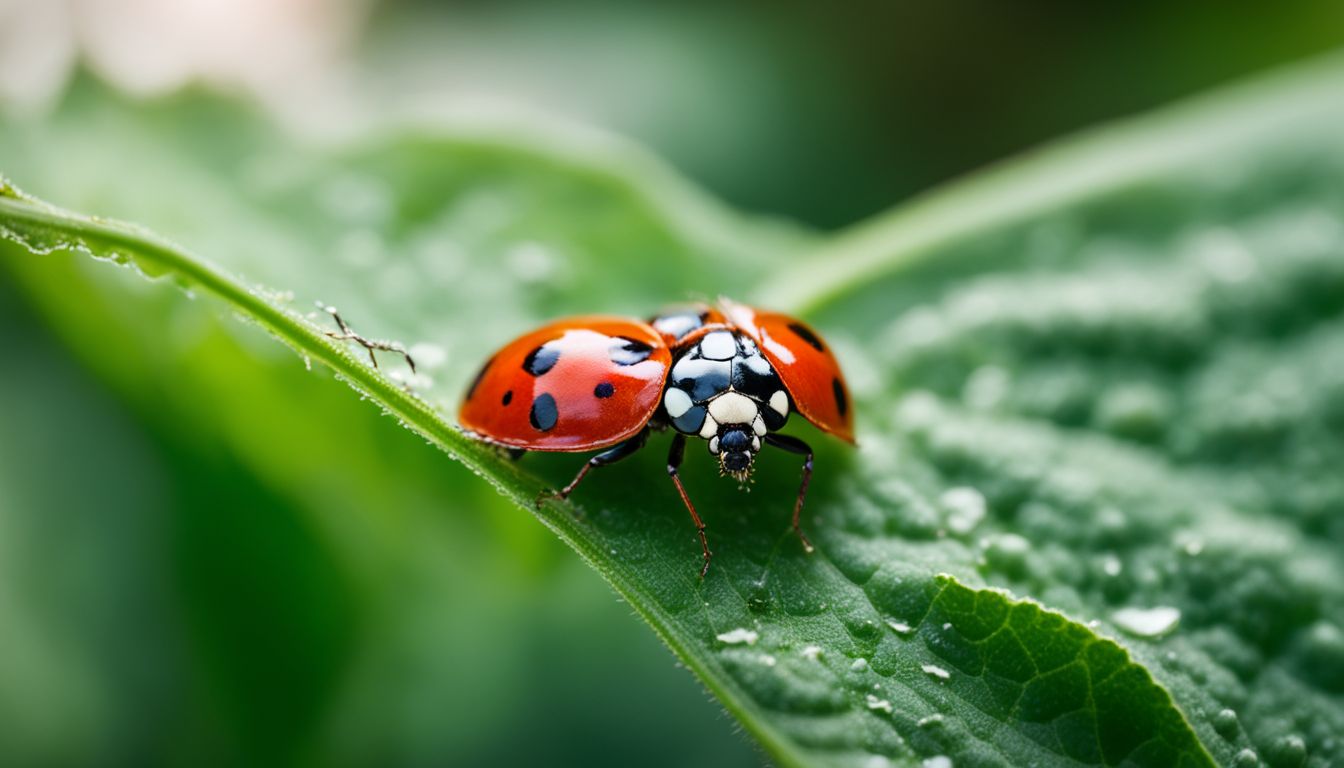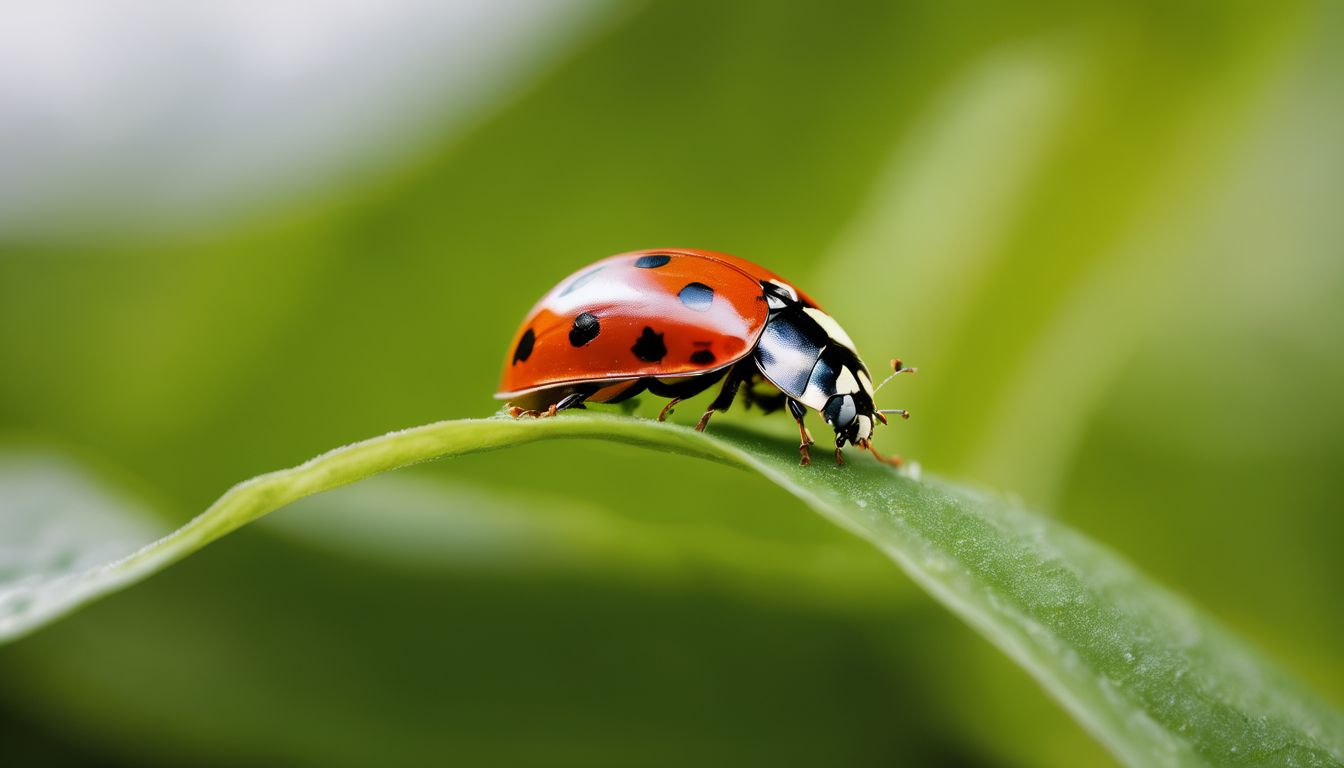You might wonder if the cheerful ladybugs in your garden are snacking on spiders. It’s true, these charming insects are not just pretty to look at; they’re also hungry predators that eat small spiders among other pests.
This article will unveil the truth about ladybugs’ diets and how their spider-eating habits can benefit your green sanctuary. Keep reading to discover why these tiny beetles might be the heroes of your garden!
Key Takeaways
- Ladybugs primarily feed on soft – bodied insects like aphids, scale insects, and spider mites. While they may eat small spiders as part of their diet, spiders are not their main prey.
- Ladybugs play a crucial role in natural pest control by consuming harmful insects such as aphids and spider mites, contributing to the overall health of plants in gardens and fields.
- Ladybugs can be beneficial allies for gardeners and farmers seeking natural pest control solutions due to their voracious appetite for spiders and other harmful pests.
Debunking Myths: Do Ladybugs Eat Spiders?

Contrary to popular belief, ladybugs do not typically eat spiders. While they are opportunistic predators and may cannibalize their own species, their primary diet consists of soft-bodied insects like aphids and scale insects.
Understanding the truth about ladybug dietary habits can help dispel this common misconception.
Examining the evidence
Many people think ladybugs might eat spiders, but the truth is different. Ladybugs have a hard shell that protects them from being easy food for spiders. Also, they don’t usually go after spider mites or their eggs for a meal.
They like to munch on pests like aphids instead. This makes them super helpers in gardens.
Spiders often leave ladybugs alone because they are not their favorite snack. There is no sign that jumping spiders hunt ladybugs either. It seems that both these bugs mind their own business most of the time.
Let’s now take a closer look at what ladybugs really love to eat.
Understanding ladybug dietary habits
Ladybugs love to eat pests that hurt plants. They munch on soft bugs like aphids and mealybugs. These little beetles can eat a lot, helping gardens stay healthy. A ladybug’s diet is not just about eating one type of bug.
They enjoy different foods like scale insects and mites.
Their hunger helps them eat 50 aphids in one day! This makes them great for natural pest control. Ladybugs are helpers in the garden. They stop bad bugs from damaging crops without using chemicals.
Now let’s see what else these helpful beetles might have on their menu.
The Ladybug’s Primary Diet

Ladybugs primarily feed on aphids, making them an important natural pest controller in gardens. They also consume other insect pests such as whiteflies and mealybugs, contributing to the overall health of plants in their environment.
A focus on aphids
Aphids are tiny insects that suck the juice out of plants. They can hurt crops and gardens by taking away the plant’s food. Ladybugs love to eat them. In fact, during their life, ladybugs can munch on up to 5,000 insects! Most of those are aphids.
Eating so many aphids helps ladybugs get a good mix of nutrients they need to live and grow. This makes these little beetles very important for controlling aphid numbers in your garden or farm without using chemicals.
Plus, when ladybugs feed on aphids, they help plants stay strong and healthy too!
Other insects in the ladybug diet
In addition to feeding on aphids, ladybugs also consume a variety of other insects. Ladybug species are known to feed on insect eggs, including those of spiders and other predators.
They have a diverse diet that includes soft-bodied pests like mealybugs and spider mites, making them effective at controlling multiple types of garden pests.
Ladybugs play a crucial role in maintaining the balance of insect populations in gardens by preying upon harmful insects such as caterpillars and mealy bugs. Their voracious appetite for various plant-eating pests makes them valuable allies in natural pest control.
Interactions Between Ladybugs and Spiders
Ladybugs and spiders may interact in a garden ecosystem, but ladybugs primarily focus on insects as their food source. Spiders are not typically the main prey or predator for ladybugs, as they tend to target other small insects like aphids.
Do ladybugs eat spider eggs?
Ladybugs do consume spider eggs, which makes them beneficial in controlling spider populations. As part of their diet, ladybugs also feed on spider mites and their eggs. This natural behavior helps manage pest populations in an environment where spiders are a concern for plants or other insects.
Moving on to Ladybug’s Primary Diet..
Can spiders become prey or predators for ladybugs?
Spiders can actually become both prey and predators for ladybugs. Ladybugs are known to eat small spiders and their eggs, making them natural predators in the ecosystem. However, ladybugs themselves can also fall prey to certain spider species.
This complex interaction showcases the dynamic nature of the relationship between ladybugs and spiders in the wild.
In various interactions with other organisms, including spiders, ladybugs play a dual role as both hunters and potential targets. Understanding these predator-prey dynamics adds an intriguing layer to appreciating the ecological balance within which these two creatures coexist.
The Role of Ladybugs in Your Garden
Ladybugs play a crucial role in maintaining the health of your garden by acting as natural pest controllers. With their voracious appetite for aphids and other harmful insects, they can help keep your plants healthy and thriving.
Ladybugs as natural pest controllers
Ladybugs are great at controlling pests in gardens. They eat aphids and other harmful bugs that can hurt plants. These helpful insects can be used to keep crops safe from plant-eating bugs, like aphids, which they love to gobble up.
This means they play a big role in protecting the environment and keeping plants healthy.
Not only do ladybugs help fight off bad bugs, but they also make sure our gardens stay blooming and lively by eating the insects that harm flowers and crops. Their appetite for pests makes them an essential part of creating a balanced ecosystem where plants thrive without being eaten alive by pesky insects.
Why you might want ladybugs around
Ladybugs can be beneficial in your garden because they help control pests like aphids, which eat plants. They are also known to eat other insects and mites that can harm your plants.
Having ladybugs in your garden is a natural and effective way to keep pest populations in check without using harmful chemicals.
Having ladybugs around means you have natural pest control working for you, reducing the need for insecticides and helping to maintain a healthy balance in your garden ecosystem. This can lead to better plant health and less damage from pesky bugs.
Conclusion
In conclusion, ladybugs are beneficial predators in gardens and fields. They play a crucial role in controlling harmful insects like spiders and their eggs. By including ladybugs in gardens, it helps maintain a healthy balance with nature by keeping pest populations under control.
Their voracious appetite for spiders makes them valuable allies for gardeners and farmers seeking natural pest control solutions.
Ladybugs mainly eat plant-eating insects and pests like aphids, scale insects, and spider mites. They are skilled at killing small spiders as part of their diet, showing that ladybugs can be voracious predators.
These creatures need an ample supply of food in their environment to sustain their daily insect-eating activities.
The evidence suggests that ladybugs are natural enemies of aphids but can also consume a wide variety of other insects on a daily basis. Ladybugs play a vital role in controlling garden pests by feeding on these harmful insects, making them valuable allies for maintaining the health of your garden.
While ladybugs are unlikely to interact with brown recluse spiders, understanding all inhabitants of your garden ecosystem is important; learn more about the habits and habitats of brown recluse spiders.
FAQs
1. Do ladybugs eat spiders?
No, ladybugs usually don’t eat spiders. They mainly eat aphids and other small insects like whiteflies and mites.
2. What are the usual food sources for ladybugs?
Ladybugs feed on pests like aphids, mealybugs, and mites that harm plants. They sometimes eat nectar or pollen if bugs are hard to find.
3. Can all types of lady beetles help control pests?
Yes, most lady beetles are good at controlling pests in gardens and on farms by eating insects that damage crops.
4. Why do gardeners like having ladybugs around?
Gardeners love having ladybug because they naturally get rid of harmful bugs which helps keep the garden healthy without using chemicals.
5. Will a Mexican bean beetle harm my garden plants?
The Mexican bean beetle is an invasive pest that damages beans and other legumes so it’s not good for your plants.
6. How do pink-spotted lady beetles fit into pest management?
Pink-spotted-lady-beetle-helps-keep-bad-insects-away-by-eating-them-which-is-part-of-integrated-pest-management-to-make-farms-healthier.




